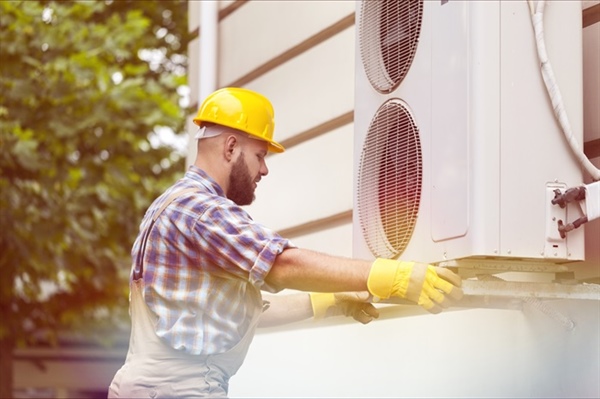Why Does My Air Conditioning Smell Like Vinegar?

Have you noticed a sharp, sour smell, like vinegar, coming from your air conditioner? It’s not just unpleasant; it could be a sign that something is wrong with your A/C system.
There are various reasons that an air conditioner might emit this unusual smell, and the issues can affect your indoor air quality and the unit's overall efficiency.
In this article, the Tiger Plumbing, Heating, & Air experts explore some common reasons behind this odor and offer actionable steps to address and prevent it.
Whether you’ve just started noticing a strange smell or want to take preventive measures, keep reading to find out what could be going on with your A/C and how to keep it running smoothly and odor-free.
What Causes an Air Conditioner to Emit a Vinegar-Like Smell?
A vinegar-like smell can stem from several causes, each of which can affect the efficiency and safety of your system. Most often, they include:
Bacteria or Mold
These can occur in the evaporator coil, drain pan, or ductwork, where moisture accumulates and creates a breeding ground for microorganisms that release unpleasant odors.
Refrigerant Leaks
If the refrigerant levels are too low or if there’s a leak in the system, the system can produce an acidic, vinegary smell. This issue should be addressed immediately, as refrigerant leaks can harm your health and the environment.
Electrical Issues
Lastly, electrical problems such as overheating components or malfunctioning wiring may produce a similar odor, indicating a more serious issue with your A/C’s internal systems.
If you suspect any of these issues are causing the smell, it's important to take action and contact air conditioning services to have them addressed.
How Can I Check for Mold or Mildew in My AC Unit?
You'll need to perform a basic inspection of the unit to determine if mold or mildew is contributing to the unpleasant smell.
Start by turning off the system to ensure safety. Then, remove the front cover or access panel to check the evaporator coil, blower motor, and other interior components for signs of visible mold growth. Mold often appears as black or dark spots on damp surfaces, and a musty odor usually accompanies it.
Another area to check is the condensate drain pan, which collects moisture from the cooling process. Stagnant water can encourage mold and mildew growth if the drain pan isn't draining properly. Clean the pan and flush the drain line regularly to avoid future buildup.
If the mold is widespread or difficult to reach, it’s a good idea to schedule professional A/C maintenance for a deep cleaning that ensures your unit is mold-free.
How Do I Clean a Dirty Air Filter to Eliminate Odors?
Filters are designed to capture dust, dirt, and other airborne particles but can become clogged over time. When this happens, the airflow becomes restricted, and the buildup of dirt can also produce foul odors, including a vinegar-like smell.
To clean or replace the air filter, first turn off the unit. Next, remove the filter and either wash it (if it’s reusable) or replace it with a new one.
Be sure to follow the manufacturer’s instructions for cleaning or replacement, and consider using a high-efficiency particulate air (HEPA) filter for better air quality.
Regularly maintaining your air filter helps eliminate odors and improves the overall performance of your unit.
If the odor persists after cleaning the filter, it may indicate a more significant issue within the system.
What Maintenance Steps Can Prevent Future AC Odors?
Preventing future odors from your air conditioning unit requires regular maintenance, including keeping the system clean and ensuring all components function properly.
Start by scheduling seasonal maintenance checks with a professional to inspect and clean critical parts like the evaporator coil, condenser, and ductwork.
Keeping these areas free from dust and moisture buildup will help prevent the growth of mold and bacteria that cause unpleasant smells.
Additionally, regularly changing or cleaning the air filters - typically every 1-3 months, depending on usage - is essential for maintaining good airflow and reducing odor issues.
It's also wise to keep the surrounding area of your outdoor unit clean by removing any leaves, debris, or standing water that could contribute to mold growth or pest infestations.
When Should I Call a Professional for AC Odor Issues?
While some minor odor issues can be resolved with DIY maintenance, there are times when professional help is necessary.
If you’ve already cleaned the air filters, checked for mold, and performed routine maintenance, yet the vinegar smell persists, it could indicate a more serious underlying problem, such as a refrigerant leak or an electrical issue.
Other signs that you should call a professional include excessive moisture around the unit, unusual noises, or reduced cooling efficiency. These issues could indicate something more complex, like a failing compressor or evaporator coil.
A licensed HVAC technician can diagnose and fix the problem efficiently, ensuring your A/C operates safely and effectively.
How Can Tiger Heating and Air Help with AC Odor Issues?
Tiger Heating & Air is well-equipped to address the vinegar-like smell in your air conditioning system.
With years of experience in air conditioning repair and maintenance, our team of certified technicians can diagnose and resolve the underlying causes of unpleasant odors, whether due to mold, refrigerant leaks, or electrical issues.
If you've been dealing with persistent odors, we offer comprehensive repair services to ensure your unit runs smoothly and safely.
From cleaning clogged filters to addressing mold or bacteria buildup, our experts know how to restore the freshness of your indoor air while improving your system's efficiency.
Since 2001 we have been providing the Eden Prarie community with reliable, expert solutions. We have you covered with 24/7 emergency services and can help with everything from heating to plumbing issues to keep your property on track.
Ready to schedule an appointment? Contact us today for your free estimate.